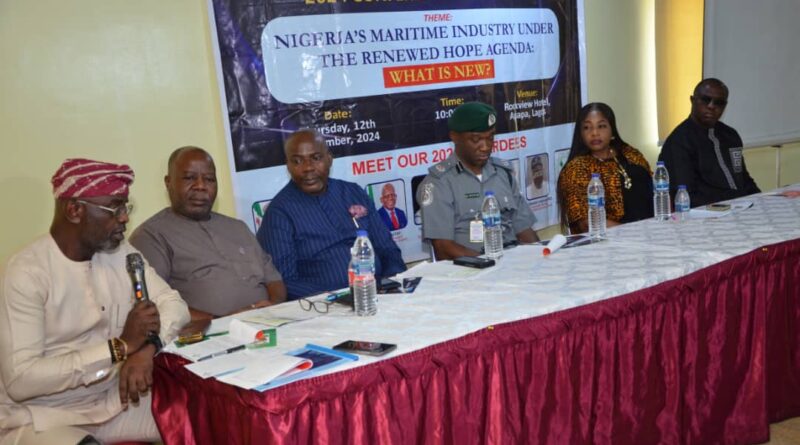PRAB Will Boost Maritime Competitiveness Based On Global Best Practices……NSA
PRAB Will Boost Maritime Competitiveness Based On Global Best Practices……NSA
As they Seeks Stakeholders’ Support.
Lucky Akra
The Nigerian Shippers’ Council (NSC) has said the Port Regulatory Agency Bill will boost maritime competitiveness based on global best practices and position Nigeria as a regional hub for shipping
This has prompted their call on stakeholders in the maritime sector to support its shipping and Port Economic Regulatory Agency Bill 2023 into law.
This statement was made by the Executive Secretary/Chief Executive Officer of the NSC, Barrister Akutah Pius at the 2024 annual conference and awards of the Association of Maritime Journalists of Nigeria (AMJON) on Thursday in Lagos with the theme: “Nigeria’s Maritime Industry Under the Renewed Hope Agenda: What is New?”
According to him, the bill, if it becomes law,would enhance regulatory authority; enforce compliance; regulate charges; improve efficiency; eliminate exploitative practices; bring about fairer trade conditions, fast dispute resolution, amongst others.
He further explained that the bill will also boost maritime competitiveness based on global best practices and position Nigeria as a regional hub for shipping.
Akutah who was represented by Rotimi Anifowose,the Director, Strategic Planning and Research, while speaking on the topic, “Achieving a Profitable Port System: NSC Duty as Port Economic Regulator” said all hands must be on deck to see it actualised.
He said: “For a country that wants to have the renewed hope agenda emplaced in the Nigeria maritime industry, we must collectively emphasise on the functionality and role of the port economic regulator.
“For us in the Council, we have been in the forefront of the promotion of the Nigerian Shipping and Port Economic Regulatory Agency Bill 2023. The bill, when passed into law, will empower the Council to effectively perform its regulatory function in the port sector. I can tell you that the bill, as of now, has been done concurrently by the House of Representatives and the Senate.
“We are calling on everybody to support us in making sure that the President and Commander-in-Chief of the Armed Forces assent to this bill to make it an act that will be very instrumental in the realisation of the Renewed Hope Agenda within the industry. We need everybody to join us.
“There are so many things that we can fix, not because we can not fix them, but because we need to put structures on the ground that will fix them. If you are talking about port efficiency, there is a need for regulatory functions to be addressed. If you are talking about effective trade facilitation, there is also a need for the port economic regulation to be addressed. ”
Speaking on some of the recent achievements of the NCS, he said the Council signed a formal bond with the Minister of Marine and Blue Economy in May, 2024; facilitated the official commissioning of the Funtua Inland Dry Port; negotiated and facilitated the signing of the agreement on minimum standards of provision of service for maritime workers who were hitherto being treated like slaves.
He listed others to include the elimination of incidences of illegal capital flight and also the development of a mobile application that provides real-time trade, shipping, and logistic information to industry stakeholders.
According to him, these efforts by the council’s are geared towards making sure that the Renewed Hope Agenda for the maritime sector is realised and for Nigeria to take its rightful place in the global market.
He added: “If not 90 per cent, 85 per cent of the cargo in Lome Port are Nigeria bound. What we have are just transhipment. We need to put our hands on deck.
“To the Customs, you are getting revenue for the government, but you and I know that we can do more. We need to create a conducive environment that will make importers and exporters to have confidence in our ports.
“That’s why we must all come together and support the Nigerian Shippers’ Council drive to make this reform an act so that the effective port economic regulatory function can be attained.”




